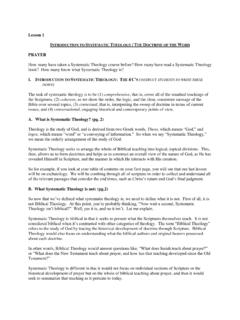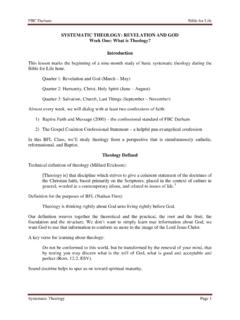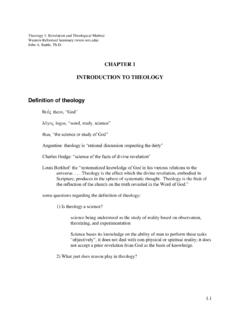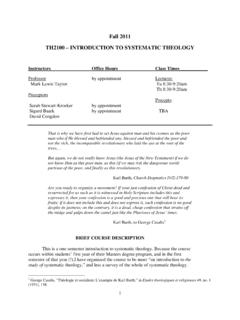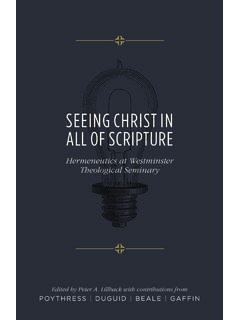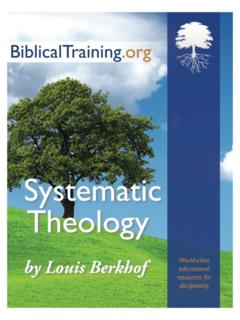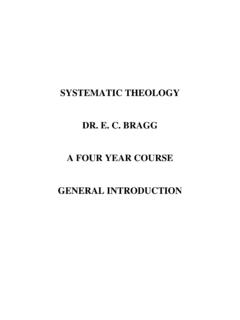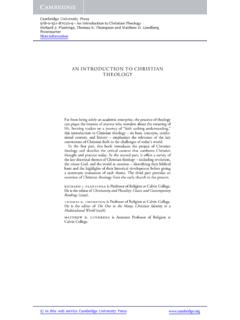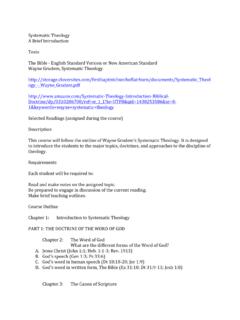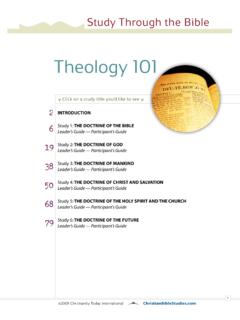Transcription of Syllabus INTRODUCTION TO SYSTAMATIC THEOLOGY …
1 1 Syllabus INTRODUCTION TO SYSTAMATIC THEOLOGY OUTLINE Instructor:_____ 2 INTRODUCTION systematic THEOLOGY , though having once fallen on hard times in both the evangelical church and in the academy (for different reasons in each group), is now making a comeback. It should, for it is both possible and necessary. systematic THEOLOGY , then, for our purposes, is the study of all facts about God and his work, from any and every source, but revealed primarily in the Bible, and brought together in a coherent and inter-related manner in order to instruct, encourage and guide the saints in There are several reasons for studying, organizing, and presenting the major teachings of Scripture.
2 Here are two: For the development of one s own understanding of God, truth, and the Christian faith. Peter admonishes us to grow in the knowledge (not just cognitive, but at least including that) of our Lord and Savior Jesus Christ (2 Peter 3:18). In this way you will promote truth, avoid errors, and give yourself great opportunity to live an ethical and holy life. In short, the goal is that we live a life honoring to the Lord, worshiping him in truth (John 4:24), serving his church properly and in truth (Eph 4:15), and finding ourselves salt and light to our fellowman (Matt 5:16; Rom 13:8).
3 For explaining, defending, and applying Biblical truth in a non-Christian context. Again Peter tells us to always be ready to give an answer for the reason for the hope which is in you (1 Peter 3:15). How much better if the answer is thought through and really reflects a balanced summary of biblical teaching! 1 For the most part this INTRODUCTION will refrain from all technical discussion and the historical development of these doctrines. It is purely intended for the beginner. After they have studied the INTRODUCTION , however, it would be a good idea to advance to further discussion on each of these topics.
4 Also, the reason the author has continued to use such words as bibliology, eschatology, etc. is so that the student can learn what they mean so that he/she will be better prepared to advance to more detailed discussions where these words appear frequently. 3 Bibliology: The Bible The term Bibliology (from Greek biblos meaning book ) refers to the study of the nature of the Bible as revelation. It often includes such topics as revelation, inspiration, inerrancy, canonicity, illumination, and interpretation.
5 Revelation We use the term revelation to translate the Greek term ajpokavluyi" apokalupsis, which means to unveil or uncover. Biblically speaking, revelation is the act and process whereby God makes Himself known to men and angels. This he has done through miracles, visions, dreams, theophanies, providential control of history, conscience, Jesus Christ, and Scripture. Theologians have spoken of general revelation through nature ( , the created order), conscience, and providentially orchestrated history and special or particular revelation primarily in Christ and Scripture (Ps 19:1-6; Rom 1:18-20; 2:14-16; Acts 17:24-34; John 1:14-18).
6 Thus general revelation is equally available to all men at all times and while it alone cannot save, it is nonetheless both essential and preparatory to special Inspiration Inspiration is the theological word, derived from the Latin term spiro, used to refer to the process whereby God superintended the human authors of scripture so that what they wrote was simultaneously their own words as well the Word of God himself; God breathed out his words through the words (using the minds and personalities) of his spokespeople.
7 Thus, through Spirit-inspired writings God has preserved an historical/theological record of his words and deeds and has given it to his covenant people as a means of grace that they might trust him fully and obey him implicitly. As a result of our sinfulness and finiteness we stand in need of such divine guidance and wisdom; scripture was inspired to that end. Inspiration, however, is not limited to mechanical dictation (indeed, very little of it can be said to be mechanical in any way), as we might have, say, in the receiving of the Ten Commandments (or the letters to the churches in Revelation 2-3), but rather occurred in a variety of situations involving the writers as whole people (their minds, emotions, wills, etc.)
8 In their own particular life situations (linguistic, religious, political, economic, etc.). The end product, however, was always God s Word to man through man (2 Tim 3:16; 2 Pet 1:20-21) and carries his full weight and authority. Technically speaking, inspiration applies to the autographa (not copies or translations). Some theologians have referred to the verbal (extending to the actual words, not just concepts), plenary (the entire Bible, not only those parts that seem to speak directly to issues of faith and practice) inspiration of Scripture.
9 In our opinion, this is the view that (1) best corresponds to the view of OT writers, the prophets, Christ himself and his apostles, and (2) best represents the historic position/understanding of the church on this issue. Since the Enlightenment in France and Germany (17th/18th centuries), however, it 4has been fashionable to deny the verbal, plenary inspiration of Scripture in light of apparent historical inaccuracies and philosophical objections, particularly with the existence and nature of God as well as the limitations of language.
10 But, while we can learn much from these views, we may safely set aside their antisupernaturalistic prejudices as both unfounded and contrary to the teaching of Jesus who himself strongly upheld the complete trustworthiness of Scripture without reserve ( , Matt 5:17-20).3 Inerrancy Inerrancy, although not always properly defined, is a logical corollary to inspiration and in no way diminishes the human authorship of scripture. If what the authors of Scripture penned was indeed under the supernatural influence and guidance of the Holy Spirit (as is properly affirmed), then since God is true, what they wrote and affirmed is in all ways true as well.
